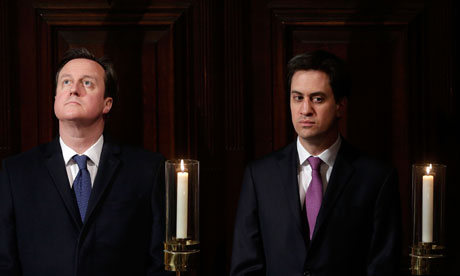UKIP Ascendant

In a nutshell, this is the big political story of the day - UKIP have topped a national election for the first time ever, and they're loving it. Nigel Farage has been talking of political earthquakes for a while now, but it does now look as if he really might have gone and done it.
Having said that, we must be careful not to overstate the impact of UKIP's victory. They got 24 MEPs out of 70 for Great Britain - just over a third - which is a not inconsiderable feat, but Labour was close behind on 20 and the Tories just behind them with 19. This does not represent a mass conversion to UKIP among the general population; it represents an almost three-way split in the vote between the three principal neoliberal parties in the UK. The amount of attention the mainstream media have placed on UKIP's victory is understandable from a sensationalist point-of-view, but is hardly justifiable academically - the Tories beat Labour in 2010 by a wider margin, but were unable to form a single-party government. Be clear - this is no landslide.
It is, however, undeniably a major development in British politics. There are, it seems to me, three major factors behind the rise of UKIP - disaffection with the political classes, the perception of mass immigration from within the EU and a complete inability of the pro-EU side to articulate any kind of argument against the rampant media-fuelled Euroscepticism which has taken hold of the country. Exploitation of these three trends in popular opinion has allowed Farage to make good his promise and claim victory on Europe.
The question is, what now? What does the success of UKIP at these elections mean for the general election in less than a year's time? Farage claims that UKIP will take a number of seats in Westminster in 2015 whilst the other parties seem to be of the opinion, wishful thinking or not, that this short-term boost will desert him and UKIP will find itself beaten well back into fourth. The first-past-the-post electoral system in use for general elections means that UKIP will have their work cut out - the party received nearly a million votes in 2010 but won no seats - but to suggest, as Philip Hammond has done, that all those who donned the purple on Thursday will take up the blue and the red again in less than twelve months is absurd.
Sadly, it is quite likely that UKIP will make their electoral breakthrough in Westminster in the next year - whether at the Newark by-election scheduled for the fifth of June or next April remains to be seen (I suspect the latter). It may even hold the balance of power, though I would deem that very unlikely, but even one UKIP MP should be a worrying prospect to anyone whose fondness for neoliberalism and xenophobia is anywhere near as limited as mine.
Where Have All the Lib Dems Gone?
 Oh dear. Oh dear, oh dear, oh dear... The Liberal Democrats, having fought the election as 'the Party of In', are O-U-T Out. Ten of the party's eleven MEP's fell to the scythe of public opinion, leaving poor Catherine Bearder (representing South-East England) the only member the UK liberal will send to Brussels when the European Parliament reconvenes in July.
Oh dear. Oh dear, oh dear, oh dear... The Liberal Democrats, having fought the election as 'the Party of In', are O-U-T Out. Ten of the party's eleven MEP's fell to the scythe of public opinion, leaving poor Catherine Bearder (representing South-East England) the only member the UK liberal will send to Brussels when the European Parliament reconvenes in July. Well, I can't say I'm particularly shocked - or that I'll be losing much sleep over this turn of events. The Lib Dems may profess to be the party of in, but it was their miserable failure to articulate the arguments for the EU - coupled with a stubborn refusal to tackle the issues it does have, such as its democratic deficit and the madness of the proposed TTIP deal - which caused them to suffer such a humiliating defeat. In essence, the Liberal Democrats are identical to the Tories and Neo-Labour in every way OTHER than their uncompromising support for the EU, and they failed to explain why that difference alone made them worth voting for over and above those two parties. Therefore, is it really any wonder that their votes were siphoned off?
The protest vote, meanwhile, was essentially hoovered up by UKIP - with the those left-wingers who would never vote for Farage's mob in a million years defecting to the Greens instead - and thus was the Liberal Democrats' coffin sealed. Will we see a similar collapse next May at the general election? Quite possibly - some projections are suggesting a loss of a third of their Parliamentary seats. The devastation is unlikely to be as total as at Europe - public dissatisfaction with the EU was undoubtedly the main factor behind this disaster, and that should recede somewhat by next year - but I would not be surprised to see considerably less yellow rosettes on election night than in 2010.
And frankly, I can't wait.
Labour and the Tories - Eds Are Going to Roll...
I'm sorry, I couldn't resist.

As far as the Tories and Labour are concerned, that was a close one - only one seat and 1.5% of the vote between them. For Labour, that's not good - not good at all. At this point in an election cycle, the Opposition should be trouncing the government in every poll. Taken together with the party's lacklustre performance in the local elections - an increase in only 338 councillors in the strongest Labour-voting seats - and its average poll lead of scarcely above the margin of error, this would seem to suggest that Labour are most certainly not on course for a majority in the general election.
Of course, anything could happen over the next year, and it's not looking too good for the Tories either - the peculiarities of first-past-the-post mean that they generally need a good two-point lead over Labour nationally to get a victory on the basis of uniform swing, and this they most certainly do not have. A hung Parliament, then, is looking increasingly likely - not that it hasn't seemed that way for some time - with the Lib Dems probably holding the balance of power. Still, political predictions are usually wrong, so who knows? - we might end up with a majority Christian People's Alliance government after all.
If we do, I'm emigrating.
Green Explosion? Not Quite...
 Natalie Bennett (the Green Party leader in England and Wales) suggested her party might treble its number of MEPs. Sadly, this was not the case - the Greens won only one additional seat, in the South-West of England, to add to their London representative and Keith Taylor's stronghold in the South-East.
Natalie Bennett (the Green Party leader in England and Wales) suggested her party might treble its number of MEPs. Sadly, this was not the case - the Greens won only one additional seat, in the South-West of England, to add to their London representative and Keith Taylor's stronghold in the South-East. This actually quite surprised me - I thought six was optimistic, but I would have thought a fourth Green was not an unreasonable expectation. Perhaps that's the old confirmation bias acting up again - it's not really a secret I vote Green whenever I get the chance - but the fact they are the only party with a sensible policy towards Europe (have a referendum because hey, we're a democracy, campaign to stay in and then do their utmost to fix the issues with its democratic processes and mad international trade deals) would seem to have made them the ideal choice in a European election.
Regardless, an increase of one might not sound amazing - it isn't - but it is, technically, +50% so I suppose that's something. Any other party would kill for an exponential like that. This increase is likely due to the fallout from the Lib Dems going into coalition with the Tories - as some on the left of the party have drifted into the Labour camp, still some others (realising Neo-Labour for the neoliberal pack of liars they are) will have turned to the Greens. As for the reason they didn't do better - that's a little trickier, but likely has something to do with UKIP attracting the majority of the protest vote, some of which would otherwise have gone to the Greens - especially considering 73% of UKIP voters are demonstrably left-wing.
The Rise of European Fascism
 Those are some words which should scare the hell out of you. They scare the hell out of me. It's tempting, given that the only fascist MEP from the UK - the BNP's Nick Griffin - lost his seat, to think that these elections were a triumph for democracy. UKIP - who might be on the same right-wing populist spectrum as the BNP and others, but are relatively moderate by comparison - have swallowed up the BNP's support base and put paid to Griffin's vile organisation. It's very tempting, but it's also very narrow-minded.
Those are some words which should scare the hell out of you. They scare the hell out of me. It's tempting, given that the only fascist MEP from the UK - the BNP's Nick Griffin - lost his seat, to think that these elections were a triumph for democracy. UKIP - who might be on the same right-wing populist spectrum as the BNP and others, but are relatively moderate by comparison - have swallowed up the BNP's support base and put paid to Griffin's vile organisation. It's very tempting, but it's also very narrow-minded.Because elsewhere in Europe, things are changing. For the worse. In France, Marine Le Pen's anti-Jewish, anti-Muslim Front National won the elections, gaining 24 MEPs; in Hungary the openly neo-Nazi party Jobbik won approximately 15% of the vote - a comedown from their general election showing, but still enough to claim 3 seats; Greece's Golden Dawn, the leader of which has a Swastika tattoo and much of which's leadership is currently in prison for racially-motivated crimes, claimed another three - their first ever MEPs. All across Europe, the far-right has either advanced or held its ground, with the result that this European Parliament will contain more fascists and fascist sympathisers than it will Greens and Liberals combined.
The rise of UKIP in the UK is infinitely preferable to the triumph of these kinds of people on the continent, but it is all symptomatic of the same fundamental disease - the poison of right-wing populism: engineered by the media, fuelled by economic devastation and politicians' inability to connect with their electorates and exploited by thugs, racists and ultra-nationalist fearmongers across Europe. We need a fundamental change in our political culture, not just in the UK but across the EU - and indeed, across the Western world - or this sorry tale will only get worse.
Postscript
This does relate to the EU, I promise. As some of you know, the EU and the USA are currently trying to force through a deal which will allow US corporations to sue European governments in secret courts for regulating their operations and to forcibly buy out essential public services such as the NHS. Please help to stop them by signing this petition.





